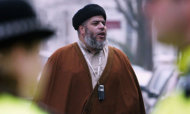Radical preacher Abu Hamza can be extradited to the United States to face terrorism charges, the European Court of Human Rights has ruled.
The court decided there would not be a violation of the European human rights code, which prohibits inhuman and degrading treatment, if Hamza is sent to America.
In total, the judges ruled five of six extradition cases - all concerning alleged international terrorists - to the US can go ahead.
As well as the preacher, the four other cases are Babar Ahmad, Haroon Rashid Aswat, Syed Tahla Ahsan and Adel Abdul Bary.
Judges rejected the men's claims they could face prison conditions and jail terms that would expose them to "torture or inhuman or degrading treatment or punishment".
The ruling is a boost for the Government, although the court stressed that it only becomes final after three months if there is no further appeal.
Home Secretary Theresa May welcomed the decision and said the suspects would be handed over "as quickly as possible".
 |
| Court Rules Hamza Can Be Extradited To US |
The case of a sixth man, Khaled al Fawwaz, was adjourned because further submissions are needed about his schizophrenia and detention at Broadmoor Hospital.
Between 1999 and 2006, the six men were all indicted on terrorism charges by the US and their extradition requested - leading to their arrests in Britain.
Ahmad and Ahsan are accused of various offences, including supporting terrorists and conspiracy to kill and maim.
Hamza, who is already serving a seven-year sentence in Britain for soliciting to murder and inciting racial hatred, was charged with 11 offences relating to the kidnap of hostages in Yemen in 1998, promoting violent jihad in Afghanistan and conspiring to set up a jihad training camp in Oregon.
Aswat was indicted as Hamza's conspirator in the latter charges.
Meanwhile, Bary and al Fawwaz were indicted over their alleged involvement in or support of the bombing of US embassies in Nairobi and Dar es Salaam in 1998.
They launched a battle to block extradition in the European Court of Human Rights (ECHR) in Strasbourg after attempts to do so in the English courts failes.
Arguments that the move would expose the suspects to the risk of the death penalty or extraordinary rendition or lead to a denial of justice were rejected in 2010.
Now their remaining claims about possible detention in a so-called supermax prison, ADX Florence, and the length of potential sentences have also been dismissed.
The decision comes months after the UK was refused permission to deport Abu Qatada to Jordan, where he is wanted on terrorism charges, without assurances evidence gained through torture would not be used at his trial.
Ahmad's father Ashfaq told Sky News his family were "very disappointed" by the decision and insisted his son - who has already been held for eight years without trial - should be tried in the UK.
"Babar is a British citizen accused of a crime said to have been committed in the UK and all the evidence against him was gathered in this country," he said.
"Nevertheless, British justice seems to have been sub-contracted to the US. This should be immediately rectified by putting Babar on trial in the UK and ordering a full public inquiry into the matter."
©SkyNews
©SkyNews
No comments:
Post a Comment